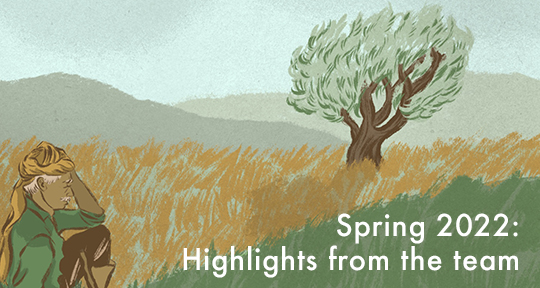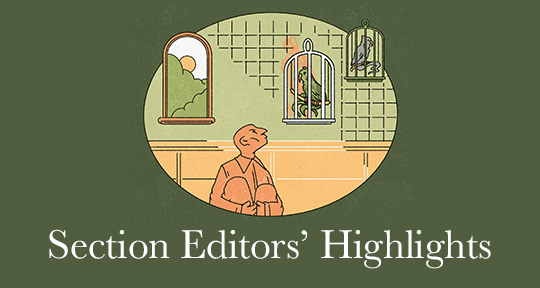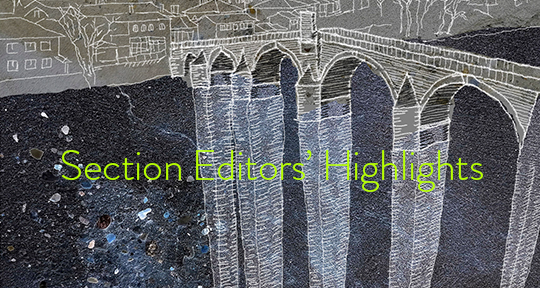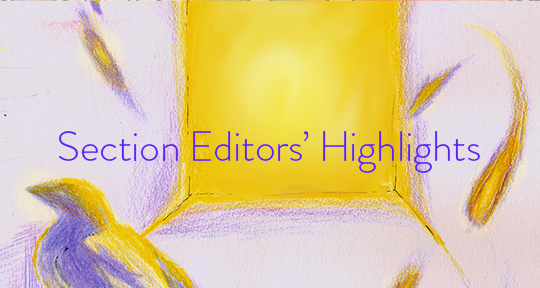I felt that the Spring Asymptote was an incredibly timely and unsettling issue and I hope that broader readers can use it as a lens to think about ongoing dynamics of imperialism, capitalism, and more. I was drawn immediately to Kim Hyesoon’s poems from The Hell of That Star (tr. Cindy Juyoung Ok), with its overwhelming and abundant female presence that kept mutating. In Signe Gjessing’s poems from Tractatus (tr. Denise Newman), I really enjoyed the tension between the abstract and the material—for example, the fact that shampoo is able to exist alongside transcendence. The voice of Nina Yargekov’s “The Obedient Little Girl” (tr. Charles Lee) was immediately disarming! I was delighted by the emphasis on disobedience at the end. Last but not least, I enjoyed reading Agnieszka Taborska’s The World Has Gone Mad: A Surrealist Handbook How to Survive (tr. Soren Gauger). Leonora Carrington is my favorite artist and writer (I actually have a tattoo of one of her paintings); it was exciting to see her mentioned at the conclusion. I also enjoyed the automatic writing components. This is a text I do need to spend more time with and I am so glad that it was included in this issue.
—AM Ringwalt, Educational Arm Assistant
I have a love for Nordic literature in general, there is something about its directness and its simplicity, and yet at the same time its ability to confront existential issues through the details of the everyday. As I live in Sweden and yet am not Swedish, I see literature as a way into understanding the place and society where I am. I was struck by how so many of the pieces in the Swedish special feature confronted the deep hypocrisy that is there in Sweden’s self-presentation as a tolerant, progressive, consensual, and equal society: The uncovering of misogyny and violence against women in the Kristina Lugn (tr. Zach Maher), Lina Hagelbäck (tr. Freke Räihä) and Hanna Nordenhök (tr. Saskia Vogel) (there is a reason that the original Swedish title of The Girl with the Dragon Tattoo was Män som hatar kvinnor [Men Who Hate Women]); or history of institutionalized homophobia in the Jonas Gardell (tr. Elizabeth Clark Wessel); and racism in the Majgull Axelsson (tr. Kathy Saranpa). These all show that there is something deeply troubling in the supposedly comfortable Swedish society that people here live in. And yet, for all this social awareness, these texts are not themselves sanctimonious or worthy. There is a distinct existential edge in each of them, they show how these social issues penetrate deep down into the world of the characters affected by them. Oppression is not an accident or mistake that can be simply rectified or remedied, it is a constitutive fact of the world as it exists and is revealed and experienced: violence, oppression, and torment penetrate and persist right through the world, into each blade of grass, bunch of flowers, childhood memory, or everyday action, and all this writing captures something of that pain and its penetration. This is the world. And it needs to be shown and seen again, recognized for what it is, as it is in this writing; and through the seeing again that this writing provides, it can also be recreated as other than it is.
—Liam Sprod, Copy Editor
Andrii Krasnyashchikh’s As Bombs Fall (tr. Matthew Hyde) made me cry. This account of daily life in Kharkiv made me think of my grandmother living in Rome under Nazi occupation—the immediacy of daily life while the world crumbles around you. Accounts such as this allow us a window into the individual human impact of war that newspaper reportage does not. Johannes Lilleøre’s My Sick Friend (tr. Sharon E. Rhodes) read like prose poetry. I love the way it plays with time: we move through a life, and then once illness strikes, time slows down. The taut, matter-of-fact sentences, with their seemingly throwaway observations and details, evoke not just the immediacy created by bodily illness and suffering, but also convey the pain and helplessness of the narrator. Kate Tsurkan’s interview with Zenia Tompkins discusses so many vital questions, for example: what responsibility do we children of the diaspora have to our homelands? How much is our image of homeland shaped by the trauma of our parents and grandparents?
—Amaryllis Gacioppo, Newsletter Editor




